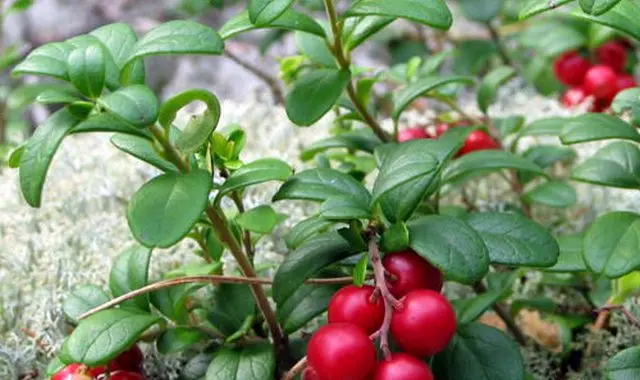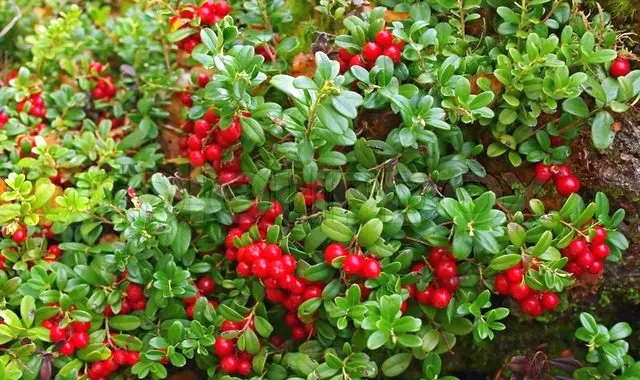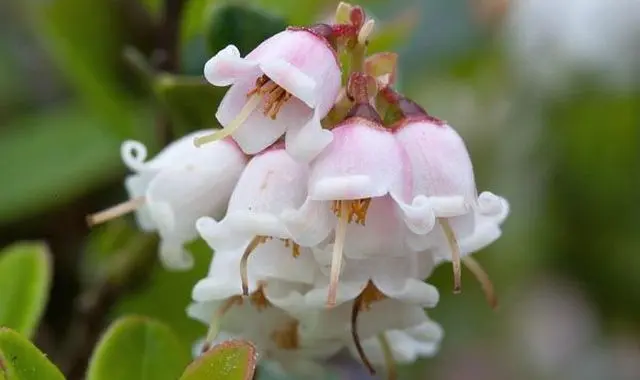Contents
Lingonberry – a very healthy berry contains numerous medicinal and nutritional benefits. Popular in various forms and products such as wine, liquor, syrup, lingonberry jams and jellies, cheesecakes, cocktails, soufflés, sorbet, ice cream, candy and more. The benefits and harms of lingonberry – we will consider from all sides.
Where does lingonberry grow
Lingonberry is a short evergreen shrub that bears edible fruit.
Lingonberry is home to boreal forests and arctic tundra throughout the Northern Hemisphere from Eurasia to North America. The berry belongs to the heather family, the same family includes cranberries and blueberries. Lingonberry is gaining immense popularity around the world for its health benefits. It has been used as a food and medicine for centuries.
General benefits
1. Helps prevent bacterial infections.
Lingonberries help prevent the bacterial infection Staphylococcus aureus, according to a study by the Department of Food and Environmental Sciences at the University of Helsinki in Finland. This infection enters the human body through the consumption of contaminated food.
Lingonberries have been found to contain phenolic, antioxidant, antimicrobial, and anti-inflammatory compounds that fight infections. Lingonberries also contain proanthocyanidins, hydroxybenzoic acids, flavonols – antioxidants that make lingonberries one of the best antioxidant foods.
2. Reduces inflammation.
Forty healthy men aged 60 years took part in a study of the effect of lingonberries on increasing the amount of quercetin (flavonol) in the body. Twenty subjects consumed 100 grams of berries a day for eight weeks. Another group continued to eat as usual.
The results showed that those who consumed lingonberries had more quercetin in their bodies than those who did not. Because quercetin has anti-inflammatory properties, it helps in the treatment of chronic inflammatory conditions such as arthritis.
3. Prevents the growth of cancer cells.
A study published in the journal Agricultural and Food Chemistry focused on the effects of lingonberry extracts on the human body. According to the study, the extract reduced the proliferation of colon cancer cells as well as breast cancer cells. Vitamin C, when combined with anthocyanins and antioxidants, helps to inhibit the growth of cancer cells, so there is a possibility that lingonberry can be used to fight cancer.
4. Reduces the spread of urinary tract infections in women.
Women with E. coli urinary tract infection were randomly assigned to three groups. The first group was asked to consume 50 ml of cranberry-lingonberry juice concentrate every day for six months. The second group was to drink 100 milliliters of lactobacilli five days a week for one year. The third group continued to eat as usual.
A study by the Department of Pediatrics at the University of Oulu in Finland showed a 20% reduction in the risk of UTI in the first group. No changes were found in the rest of the groups. This suggests that drinking lingonberry juice on a daily basis can help reduce recurrence of urinary tract infections.
5. Helps maintain oral health.
Bacteria form easily in the mouth, causing various diseases of the teeth and gums. Representatives of the International Journal of Dentistry reported information from studies aimed at determining the benefits of consuming antimicrobial products such as lingonberries.
The results show that the antimicrobial properties of lingonberries help reduce the risk of bacteria forming in the mouth. According to research, plaque buildup can cause gum disease. It is known that bioactive compounds in lingonberry cause destabilization of the cell membranes of pathogens that are responsible for the development of diseases. Lingonberry’s antimicrobial properties inhibit the growth of bacteria in the mouth.
6. Improves brain function.
Research has shown that eating lingonberries on a regular basis improves brain function. The berry helps maintain mental health due to its high levels of iron and potassium. Iron helps to increase the number of red blood cells in the body, which improves the supply of oxygen to the brain.
In addition, the vitamin C present in lingonberries is beneficial in preventing oxidative damage to nerve cells caused by free radicals. Research has shown that consuming lingonberries on a regular basis can help reduce the risk of Alzheimer’s disease.
7. Prevents cardiovascular disease.
Lingonberries are rich in dietary fiber, which are very beneficial for the cardiovascular system. They prevent various types of cardiovascular diseases such as heart attack, stroke, and more. Dietary fiber helps to reduce LDL cholesterol and increase HDL cholesterol, hence helps control cholesterol levels in the body. In addition, lingonberries are rich in antioxidants that protect the cardiovascular system from oxidative damage caused by free radicals. Lingonberry is an excellent prophylactic agent against atherosclerosis and hypertension.
8. Prevents diabetes.
Lingonberry has hypoglycemic properties that are very helpful in preventing diabetes. The hypoglycemic properties of lingonberry help stimulate insulin production. They help slow the absorption of sugar in the bloodstream. Lingonberry has a low glycemic index, which means that eating this berry will not cause spikes in blood sugar levels. In addition, lingonberries are rich in fiber, which also controls blood sugar and prevents the development of diabetes.
9. Strengthens the immune system.
Lingonberries contain large amounts of vitamins C and A, which are very beneficial for strengthening the immune system. Vitamin C is a powerful antioxidant that fights free radicals and protects the immune system from oxidative damage. Moreover, it also helps to improve the production of white blood cells, which are an important part of the immune system. Eating lingonberries on a regular basis has been shown to prevent various types of common illnesses such as colds, fevers, flu, coughs, etc.
10. Improves digestion.
The tannins found in lingonberries help to enlarge the walls of blood vessels, permitting mineral metabolism and neutralizing toxins to improve digestion and tone the body. Lingonberry is a great solution for people with indigestion.
11. Improves eye health.
The large amount of vitamin A contained in lingonberries is beneficial for eyesight. The antioxidant fights free radicals and neutralizes them so that they do not cause any oxidative damage to the eye cells. Thus, macular degeneration is prevented and age-related eye problems are eliminated. In addition, vitamin A is very beneficial for the retina. Studies have shown that consuming lingonberries on a regular basis improves vision, prevents cataracts and other eye diseases.
12. Strengthens bones.
Lingonberries are rich in calcium, which is beneficial for bone health and prevents various types of bone-related diseases such as osteoporosis. Calcium is one of the most important minerals for bones. It helps to increase bone density and aids in bone growth and repair. Studies have shown that people who eat calcium-rich foods have stronger bones. In addition, lingonberries contain vitamin C, which helps absorb calcium.
13. Serves as the prevention of kidney disease.
Lingonberries have been found to improve kidney function and reduce the risk of inflammation, according to studies in rats. Studies have shown that daily consumption of lingonberry juice increases the protective function of the kidneys.
14. Fights fungal yeast.
The most problematic fungal infections in humans are those caused by the yeast candida. Not only do they cause vaginal infections and thrush, they can also cause long-term gastrointestinal problems, especially in women. In 2017, representatives of the University of Helsinki conducted a study on the effect of fermented lingonberry juice on this type of fungus.
The juice has been found to increase the intracellular response to stimuli and weaken the yeast’s ability to continue its destructive actions. Lingonberry maintains the integrity of the cell wall. It was found that lingonberry has antifungal effect, in particular, fights candidiasis.
Benefits for women
15. Improves reproductive health.
Lingonberry is used in folk medicine to improve reproductive health. It speeds up conception and is recommended for women planning a pregnancy. The berry normalizes hormones and regulates the menstrual cycle.
16. During pregnancy.
Lingonberry helps pregnant women fight puffiness, prevents intoxication, anemia, neurosis and immunodeficiency. Lingonberry juice eliminates muscle fatigue in pregnant women and helps to safely eliminate colds. The berry contributes to the correct formation of the baby’s bone apparatus.
17. With menopause.
The berry helps to cope with neuroses that often occur during menopause. It reduces sweating and prevents blood congestion in the veins.
Skin Benefits
18. Prevents pigmentation.
Lingonberry leaves are high in arbutin, which is known to reduce hyperpigmentation and age spots. Arbutin is a phytochemical that inactivates tyrosinase, an enzyme responsible for skin pigmentation.
19. Protects the skin.
The large amounts of natural antioxidants found in lingonberries, such as zeaxanthin, help protect the skin from harmful UV rays. In addition, the vitamin C present in lingonberries is also a powerful antioxidant that helps prevent the harmful effects of free radicals.
20. Improves skin health.
Antioxidants tighten the skin, oxygenate it and improve blood circulation. Vitamins A and E fight acne and wrinkles. The berry juice mask moisturizes the skin and protects it from premature aging.
Hair Benefits
21. Revitalizes hair.
Lingonberry leaves are able to make hair soft, they make it strong and voluminous. To get rid of dandruff, you can eat fresh lingonberries, as well as make anti-dandruff remedies based on the leaves.
Benefits for men
22. Fights prostatitis.
Lingonberry is a component of many drugs for prostatitis. Both leaves and berries have disinfectant and diuretic properties. For the prevention of prostatitis, you can eat fresh berries daily. Lingonberry retains male strength and strengthens the body.
Harm and contraindications
Lingonberry is one of the safest berries. Due to their low sugar content, the berries are even acceptable for type 1 and type 2 diabetics. There are no known drug interactions. People with food allergies need not worry, lingonberries are hypoallergenic.
The first clinical study of a patient to record a lingonberry allergy did not appear until 2004. This proves how rarely an allergic reaction occurs to this berry. The main condition is not to abuse the product. An excess of vitamins and minerals can cause pathologies in the body.
1. Kidney stones.
Avoid lingonberries if you have kidney problems (stones or sand). The berry can provoke an aggravation of the disease.
2. Stomach ulcer.
Do not use lingonberry tinctures and decoctions for food if you have stomach acidity or an ulcer.
3. Ailments of the urinary tract.
In the presence of diseases of the urinary tract, consult your doctor about the dosage and duration of the use of lingonberries, so as not to aggravate the ailment.
4. Low blood pressure.
Use lingonberries with caution if you have low blood pressure. Lingonberry has a blood pressure lowering property. In hypotonic patients, it can decrease to a critical level.
Chemical composition of the product
Nutritional value of lingonberry (100 g) and percentage of the daily value:
- The nutritional value
- Vitamins
- Macronutrients
- Trace Elements
- calories 46 kcal – 3,23%;
- proteins 0,7 g – 0,85%;
- fats 0,5 g – 0,77%;
- carbohydrates 8,2 g – 6,41%;
- dietary fiber 2,5 g – 12,5%;
- water 86 g – 3,36%.
- And 8 mcg – 0,9%;
- beta-carotene 0,05 mg – 1%;
- S 15 mg – 16,7%;
- E 1 mg – 6,7%;
- B1 0,01 mg – 0,7%;
- B2 0,02 mg – 1,1%;
- PP 0,3 mg – 1,5%.
- potassium 90 mg – 3,6%;
- calcium 25 mg – 2,5%;
- magnesium 7 mg – 1,8%;
- sodium 7 mg – 0,5%;
- phosphorus 16 mg – 2%.
- iron 0,4 mg – 2,2%;
- manganese 0,65 mg – 32,5%.
conclusions
Lingonberries are a delicious berry rich in antioxidants that help prevent many diseases and inflammation. By consuming lingonberries, you can treat urinary tract infections, maintain oral health and prevent the growth of cancer cells, and prevent other diseases. Add lingonberries to your diet and take advantage of their wonderful properties.
Useful Properties
- Helps prevent bacterial infections.
- Reduces inflammation.
- Prevents the growth of cancer cells.
- Reduces the spread of urinary tract infections in women.
- Helps maintain oral health.
- Improves brain function.
- Prevents cardiovascular disease.
- Prevents diabetes.
- Strengthens the immune system.
- It improves digestion.
- Improves eye health.
- Strengthens bones.
- Serves as the prevention of kidney disease.
- Fights fungal yeast.
- Improves reproductive health.
- Useful during pregnancy.
- Useful for menopause.
- Prevents pigmentation.
- Protects the skin.
- Improves skin health.
- Promotes healthy hair.
- Fights prostatitis.
Harmful properties
- Promotes the formation of kidney stones.
- Can provoke stomach ulcers.
- May cause urinary tract disease.
- Reduces blood pressure.
Sources of Research
The main research on the benefits and dangers of lingonberry was carried out by foreign doctors and scientists. Below you can get acquainted with the primary sources of research on the basis of which this article was written:
Sources of Research
1. https://www.ncbi.nlm.nih.gov/pubmed/21370878
2. https://www.ncbi.nlm.nih.gov/pubmed/12548295
3. https://www.ncbi.nlm.nih.gov/pubmed/15563205
4. https://www.ncbi.nlm.nih.gov/pubmed/11431298
5. https://www.hindawi.com/journals/ijd/2017/6185395/
6.https: //www.ncbi.nlm.nih.gov/pmc/articles/PMC5011382/
7. https://www.myfitnesspal.com/food/calories/generic-lingonberries-raw-635879428?v2=false
Additional useful information about lingonberry
How to use

1. In cooking.
You can use lingonberries in any recipe where you would normally use cranberries. The flavor and texture are similar enough that these berries are used interchangeably in most recipes. Lingonberries can be used to bake pies, make lemonade, jams, drinks and much more. It is best to eat the berries fresh, without added sugar.
In Sweden and Russia, when sugar was a luxury item, berries were usually preserved by placing them in water bottles. It was called wattlingon (soaked lingonberry). This procedure kept the berries until the next season. Berries are often mixed with pears to create a sauce that is served with poultry or caviar in Poland.
Berries can also be used to replace red currants in Cumberland sauce for a more sophisticated flavor. Lingonberry is used to make lingonberry liqueur. Lingonberry vodka is sold in Eastern European countries.
2. Use of lingonberry leaves.

Lingonberry leaves are used to treat bladder problems, gout and rheumatism. The substance arbutin, obtained from the leaves and stems of lingonberry, is used by the pharmaceutical industry in drugs for the treatment of intestinal disorders. Lingonberry leaves have antiseptic, astringent and diuretic properties. They are used to treat gonorrhea, arthritis, rheumatism, diabetes and diarrhea.
3. In cosmetology.
Lingonberry extract is added to various cosmetics. Lingonberry based masks rejuvenate and tighten aging skin. Regular consumption of the fruit prevents the appearance of wrinkles. If you consume lingonberry juice every day for a month, the skin will be rejuvenated and smoothed. Lingonberry can cure eczema and psoriasis. In this case, the lingonberry gruel is applied to the damaged areas.
How to choose
- If the berries are bright and have a dark red color, this is evidence of their ripeness.
- Unripe berries can also be purchased; they ripen easily at home. It is better to place them next to apples or tomatoes, so the ripening process will speed up.
- It is better not to take overripe berries.
- Lingonberries must be clean, free from lumps of dirt, mold and rot.
- Even if one berry on the counter is infected with mold, refuse to buy. Mold spores spread very quickly.
- When buying frozen lingonberries from the supermarket, also pay attention to the appearance of the berries.
- Don’t choose berries that have too much ice.
- If the berries are in packages, check the label. The composition should contain 100% lingonberry content.
How to store
- Benzoic acid contained in lingonberries, at low temperatures, allows you to keep the berries fresh for a whole year. To do this, they are stored in the refrigerator.
- The berries can be dried and stored in the freezer.
- Store fresh lingonberries in an airtight glass or wooden container.
- Lingonberry leaves can be stored in linen and cotton bags in a dark place. It is also allowed to use wooden and glassware.
- You can store the berry in a bottle or jar with cold boiled water.
History of occurrence
When and where the first lingonberry appeared, it still remains a mystery. The berry was not found in the excavations. This may be due to its ability to decompose quickly. The first information about its cultivation dates back to 1745. The order for the cultivation of lingonberries was issued by Empress Elizaveta Petrovna. However, under Elizabeth, lingonberries were planted only in gardens. The first lingonberry plantations appeared only in 1960.
At this time, it began to be massively cultivated and used on an industrial scale not only in Russia, but also in the USA, Germany, Sweden, Finland, Poland and Holland. In 1994, 40 hectares of lingonberry plantations were planted in Germany. The yield has increased 30 times. From one hundred square meters, they began to receive 60 kg of berries. In terms of the size of wild berries, lingonberry is second only to cranberry.
How and where is it grown

According to research, there are American and European lingonberries. The American one usually produces one crop per year in the summer, while the European one bears fruit twice a year. It grows up to 30 cm in height with branches 6–7 cm long. Lingonberry flowers are usually white or pink, and differ little from the shape and size of blueberry flowers. The lingonberry itself is usually small in size and bright dark red in color. The berry tastes like cranberries, but lingonberries are not so tart.

Lingonberry grows on evergreen shrubs and spreads along underground stems. The berry is found in all Russian boreal forests, as well as in Scandinavia, Alaska, the USA and Canada. In total, lingonberry is found in over 20 countries. It can withstand temperatures as low as –35 ° C. However, such low temperatures can adversely affect the harvest.
Lingonberry is commonly found in open areas such as windy cliffs, bare headlands, rocky ledges, hilly rocky thickets and mountain peaks, high swamps, wastelands, sand dunes and peatlands, swamps. In forests, lingonberries often grow on top of rotting stumps. In Russia, this berry is most often found in Altai and the Far East. In addition, in the Urals, the Caucasus, in the Arkhangelsk and Murmansk regions, in Karelia.
Interesting Facts
- In Sweden and Norway, reindeer and elk steak is traditionally served with lingonberry sauce.
- A traditional Finnish dish is salted deer with mashed potatoes and lingonberries.
- Canned berries are usually eaten with meatballs, potato pancakes.
- Lingonberry bushes can live for 300 years.
- An ancient Bulgarian legend says that lingonberry could heal mortal wounds, postpone death and prolong youth.
- The ancient Greek goddess of health and fertility wore a lingonberry wreath.
- Lingonberries can replace coffee. To do this, you need to dry it, fry it, grind it and steam it.
- The word lingonberry comes from the word lumber, which in Russia meant “red”.
- One hectare of lingonberry can be harvested 300 kg of berries.
- Lingonberry blooms for only 15 days.
- Lingonberry water (fruit drink) was mentioned in the work of Alexander Pushkin “Eugene Onegin”.
- In Russian written sources of the XIV century, lingonberry was called a berry harmful to young men.









